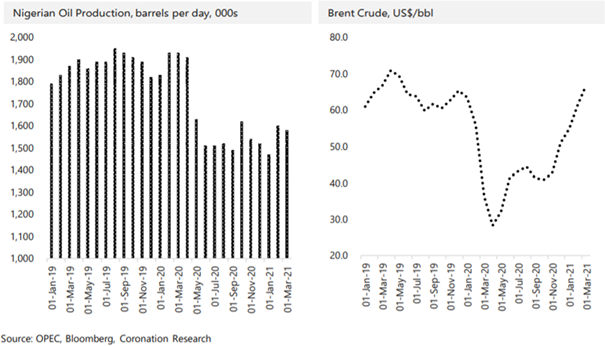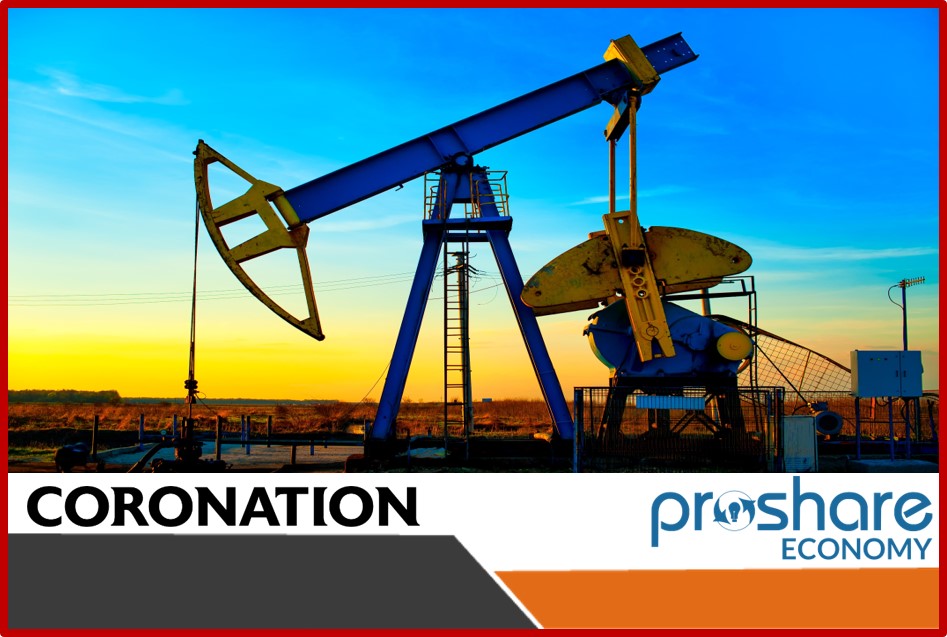Tuesday, April 14,2021 /10:18 AM / by Coronation Research / Header ImageCredit: Dailyfx
It was in April last year when oil prices hit multi-year lows, theprice of Brent crude dipping down to US$19.33/bbl late in the month and WestTexas Light hitting negative US$37.63/bbl for a day as stocks rose and storagecapacity became scarce. Then the United States convened a meeting of oilproducers, and the Organization of the Petroleum Exporting Countries and itsally Russia (OPEC+) agreed production cuts. Prices slowly recovered, with asteady and positive trend building up from early November onwards. Although oil& gas accounts for less than 10% of the Nigerian economy, its role inproviding exports, foreign exchange and contributions to the government budgetare critical. Does the current strength of oil mean that public finances arerebounding?
FX
Last week the exchange rate in the Investors and Exporters Window(I&E Window) strengthened by 0.07% to close at N409.00/US$. In theparallel, or street market, the Naira closed flat, at N485.00/US$1. Last weekNigeria's external reserves gained US$29.0 million to close at US$35.0 billion,being the highest external reserve position recorded in over a month. Thisrecent increase can be attributed to the increase in crude oil prices recordedin the run-up to early March (before the recent downtrend) and the increase indiaspora remittances as the Central Bank of Nigeria (CBN) offers incentives forevery US dollar received. Our view is that the official foreign exchangemarkets continue to suffer from a shortage of foreign currency inflows. Assuch, we believe that the gap between the I&E and NAFEX rates on the onehand and the parallel market rate on the other is likely to remain for sometime.
Bonds & T-bills
Last week, the secondary market yield for a Federal Government ofNigeria (FGN) Naira-denominated bond with 10 years to maturity rose by 56bps to11.51% and at 7 years rose by 34bps to 10.95% while at 3 years the yield fellby 31bps to 7.22%. The annualized yield on a 356-day T-bill rose by 134bps to7.98%, while the yield on a 340-day OMO bill rose by 159bps to 9.67%. In theFGN bond market the upward trends in yields over the prior week were counteredwith some buying of short duration paper, leading to significantdecline in yields in the short-end of the curve and steepening of the yieldcurve overall. The average market yield declined 3bps to close at 10.66%. Oursense is that there is still upward pressure on yields.
The week closed on a bearish note in the T-bill market whereactivity was low after the concentration on the Primary Market Auction (PMA)the week before. Despite improved offers seen across board, not many tradeswere closed, especially at the long end of the curve. Hence rates increased bycirca 20bps across all durations. The Debt Management Office (DMO) haspublished its Q2 2021 FGN bond issuance calendar for the reopening of the March2027, March 2035, July 2045 and April 2049 bonds. The auctions are scheduledfor 21 April, 19 May and 20 June. In our view, 1- year T-bill rates are stillset to continue on their upward trajectory towards yields of 10.0%, or evenmore, by mid-year.
Oil
The price of Brent crude dropped by 2.94% last week, closing atUS$62.95/bbl, a 21.53% increase year-to-date. The average price to year-to-dateis US$61.47/bbl, 42.24% higher than the average of US$43.22/bbl in 2020. Therehas been a push-pull in the market based on global vaccination acceleration,increased production, and new lockdowns, making prices struggle for direction.The US dollar fell to a two-week low against a basket of currencies, trackingTreasury yields lower, after data showed a surprise rise in U.S. weekly joblessclaims. (A weak dollar makes oil cheap for holders of other hard currencies,which can support crude prices.) On the other hand, OPEC+ agreed to increaseoil production. Our view is that oil prices are likely to remain above theUS$60.00/bbl mark for several weeks, if not months.
Equities
The Nigerian Stock Exchange All-Share Index (NSE-ASI) fell by 0.46%last week with a loss of 3.49% year-to-date. Flour Mills of Nigeria (+6.90%),Honeywell Flour Mills (+4.24%), and Okomu Oil Palm (+3.33%) closed positivelast week, while Guinness Nigeria (-17.27%), Sterling Bank (-15.68%), and MRS(-9.92%) closed negative. Performance across sectors was broadly negative thisweek. The NSE Consumer Goods Index was the highest-performing sub-index overthe week with a (+1.12%) gain while the NSE-30 Sub-Index recorded its highestloss for the week with (- 10.83%). Our view is that overall investor sentimentcontinues to be weak amid the improvements in bond yields. We will continuewith the Model Equity Portfolio next week
Oil Prices to the Rescue?
By any yardstick, oil prices and production are important toNigeria. It is not the case that the oil & gas industry is the largestindustry in the country, because it accounts for less than 10% of GDP. Rather,it is the fact that the bulk of Nigeria's exports are oil & gas; oil &gas provides the most reliable source of foreign exchange inflows; and theindustry provides (in a good year) the Federal Government with over 60% of itsbudget revenues. Looking at oil prices comes second only to looking at the exchangerate in any checklist of Nigeria's economic health.
To figure out exactly what level of foreign exchange inflows areassociated with a given level of oil production and crude prices is difficult(we have tried). There are many variables, including the sell-forward factor(crude oil is sold three to six months forward), the oil-for-product swapfactor, the premium of Nigerian blends over the price of Brent crude, and thefact that gas sales are made at contracted prices rather than at commodity prices.
However, over a long period of study (e.g. 10 years) it is possibleto establish some rules of thumb. Oil prices below US$50.00/bbl, if sustained,are associated with weak public finances and can lead to periods during whichthe gross foreign exchange reserves of the Central Bank of Nigeria (CBN) trendunder US$30.00bn, and this benchmark itself can be associated with Nairadevaluations (as in 2016, for example). So, in our view, the CBN likely heaveda collective sigh of relief when it first protected its reserve position during2020 (the low point was US$33.43bn) even though average oil prices wereUS$43.22/bbl during the year, and then saw oil prices rise towards the end ofthe year and in early 2021.

So, does the rise in crude oil prices make things better? Theanswer is 'partly'. One negative factor is the fall in production levels during2020. When OPEC and its ally Russia (hence OPEC+) agreed to cut productionlevels in order to support prices a year ago, Nigeria was obliged to make itsown production cuts. So, production averaged 1.88 million barrels per day(mbpd) in 2019 but fell to 1.66mbpd in 2020. It has not fully recovered, as thedata for March 2021 shows 1.58mbpd. If we create a very simple index of oileconomic strength (output times spot crude prices) we would find ourselves in asimilar position to January 2020, which is by no means bad, though not optimal.
However, in January 2020 (and again in February 2020) Nigeria wasable to sell over US$1.0bn worth of Naira-denominated fixed income securitiesto foreign portfolio investors so that foreign portfolio investment (FPI)continued (as it had done for many years) to be a support for the overallforeign exchange position of the CBN. Needless to say, these investments slowedconsiderably in March 2020 with the onset of the Covid19 pandemic and the crashin oil prices. It is a moot point whether - now that crude oil prices are upagain - FPI will return in significant volume to provide short-term (under oneyear) funding and bolster the FX reserves of the CBN. Our sense is that thistrade (the so-called carry trade) may take a while to be restored. So Nigeria'sability to leverage off its oil revenues has been reduced, at least for thetime being. On the other hand, the way is open for Nigeria to make asignificant US dollar-denominated Eurobond issue this year, so some of itsability to borrow against the surety of oil income has been restored.
Crude oil prices have not fully restored the oil-related financing(inflows from oil & gas sales and debt issues) that we saw during a yearlike 2019, for example. Nevertheless, the return to oil prices comfortablyabove US$50.00/bbl brings a level of security that, in our view, allows the CBNto tackle the two issues that regularly fill these pages, and that are the keypolicy areas right now: Naira inflation and Naira interest rates.
Relatedto Coronation
2. MonetaryPolicy Rate Decision
3. Inflationand Interest Rates
4. The US 10-Year Bond andNigeria
5. T-Bill Rates HeadingTowards 10.0%
6. Q42020 GDP and the Implications for Markets
7. Eurobondsand Foreign Financing
9. NigerianGDP Better Than Thought
12. Interest Rates on the Rise
13. Oil Above US$50.00 per Barrel
16. CBN Likely to Leave MPR at 11.50%
17. Second-best Equity Market in the World
18. The BidenEffect
19. US Dollar Eurobond Yields Now HigherThan Naira Yields?
20. Fiscal and Monetary Response toEvents
21. Winners and Losers in Africa
22. The Return of the Equity Market
23. Which Way for Interest Rates?
24. Coronation Research Releases Report Themed: From Savings toMutual Funds
25. A Case of Eurobond MarketContagion
27. The Policy Mix and The Markets
28. The Oil Price and ProductionParadox
29. Cracks In The Bond Market?
30. No Big Change in FX Policy
31. Coronation Research Releases Outlook for Insurance Sector -From Lagoon To The Blue Ocean
32. Micro-Insurance, Tech, Key toDeepening Nigeria's Insurance Sector - Coronation Research
33. Navigating the Capital Market:The Investors' Dilemma
34. Market Interest Rates Back Up- Coronation Research
Related News
1. NBS Publishes COVID-19Impact Monitoring Survey Report for February 2021
2. Real HouseholdConsumption Expenditure Growth Rate Stood at 0.18% in 2020 - NBS
3. Ninth Instalment,COVID-19 Impact Monitoring
4. All Commodity GroupImport Index Grew By 0.13% in Q4 2020 - NBS
5. Inflationary Pressure,Strained Pockets
6. Headline Inflation toSurge Again Towards 17.8% in March 2021
7. COVID's Heavy Blow toManufacturing
8. Oil Illusion and FinancialDelusion - LBS Executive Breakfast Session - April 2021
9. Signs of a Recovery buta Long Way off
10. PMI Reading No 96: AModest Retreat
 Lagos, NG • GMT +1
Lagos, NG • GMT +1











 904 views
904 views











 Sponsored Ad
Sponsored Ad
 Advertise with Us
Advertise with Us









